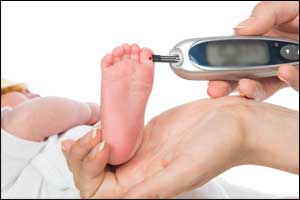- Home
- Editorial
- News
- Practice Guidelines
- Anesthesiology Guidelines
- Cancer Guidelines
- Cardiac Sciences Guidelines
- Critical Care Guidelines
- Dentistry Guidelines
- Dermatology Guidelines
- Diabetes and Endo Guidelines
- Diagnostics Guidelines
- ENT Guidelines
- Featured Practice Guidelines
- Gastroenterology Guidelines
- Geriatrics Guidelines
- Medicine Guidelines
- Nephrology Guidelines
- Neurosciences Guidelines
- Obs and Gynae Guidelines
- Ophthalmology Guidelines
- Orthopaedics Guidelines
- Paediatrics Guidelines
- Psychiatry Guidelines
- Pulmonology Guidelines
- Radiology Guidelines
- Surgery Guidelines
- Urology Guidelines
Sulphonylureas safe, effective alternative to insulin in Neonatal diabetes

Neonatal diabetes is diagnosed before the age of six months. Mutations in KCNJ11 gene cause permanent neonatal diabetes through the activation of the pancreatic ATP-sensitive potassium channel. The gene is required for proper functioning of insulin-producing cells in the pancreas. 90% of patients successfully transfer from insulin to oral sulfonylureas with excellent initial glycaemic control; however, whether this control is maintained in the long term is unclear.
The study involved analysis of all patients diagnosed with KCNJ11 permanent neonatal diabetes at five laboratories in UK, Italy, Norway, France, and Poland, who transferred from insulin to oral sulfonylureas before Nov 30, 2006. 90 patients were identified as being eligible for inclusion and 81 were enrolled in the study and provided long-term (>5·5 years cut-off) outcome data. Median follow-up duration for the whole cohort was 10·2 years.
Clinicians collected clinical characteristics and annual data relating to glycaemic control, sulfonylurea dose, severe hypoglycemia, side-effects, diabetes complications, and growth. The main outcomes of interest were sulfonylurea failure, defined as a permanent reintroduction of daily insulin, and metabolic control, specifically HbA1c and sulfonylurea dose. Neurological features associated with KCNJ11 permanent neonatal diabetes were also assessed.
Key Findings:
- In 2006, around half of people with neonatal diabetes come off insulin injections and were treated more effectively with sulphonylurea tablets.
- Excellent glycaemic control was maintained for patients for whom we had paired data on HbA1c and sulfonylurea at all time points, year 1, and most recent follow-up-- median HbA1c was 8·1% before transfer to sulfonylureas, 5·9%at 1 year, and 6·4% at most recent follow-up.
- No reports of severe hypoglycaemia were recorded in 809 patient-years of follow-up for the whole cohort (n=81).
- 93% of people in the study remaining on sulphonylureas alone after 10 years, with excellent blood sugar control.
- 11 (14%) patients reported mild, transient side-effects, but did not need to stop sulfonylurea therapy and seven (9%) patients had microvascular complications; these patients had been taking insulin longer than those without complications.
- Initial improvement was noted following transfer to sulfonylureas in 18 (47%) of 38 patients with CNS features.
Professor Hattersley said: "Switching from regular insulin injections was life-changing for these people who had been on insulin all their life; many described it as "a miracle treatment". Not only does this eradicate the need to inject with insulin several times a day, it also means much better blood sugar control. This is the first study to establish that this treatment is safe and works excellently for at least 10 years and all indications are that it will continue to work for decades more. This is great news for the thousands of patients who have made the switch from insulin."
Dr. Pamela Bowman, of the University of Exeter Medical School, who led the study, said: "It was incredibly exciting to help people make the switch from insulin to simple tablets - but the question was, would the benefits last? Half of the people with type 2 diabetes treated with sulphonylureas no longer have good blood sugar control after five years.
Dr. Elizabeth Robertson, Director of Research at Diabetes UK, said: "It's so important that people living with rare forms of diabetes, like neonatal diabetes, receive the right diagnosis and treatment. That's why we are delighted to have been able to help fund this vital work, demonstrating for the first time that sulphonylurea tablets are a safe and effective way for some people with neonatal diabetes to manage their condition for the long term. Moving forward, we hope the research will uncover ways to prevent the developmental issues people with neonatal diabetes face.
"Nine out of ten people with this condition can switch from insulin therapy when they get the right diagnosis, so we would like all children diagnosed with diabetes under six months to be tested for neonatal diabetes, so the right treatment can help them get the best start in life."
Based on the study, the authors concluded that high-dose sulfonylurea therapy is an appropriate treatment for patients with KCNJ11 permanent neonatal diabetes from diagnosis. This therapy is safe and highly effective, maintaining excellent glycaemic control for at least 10 years.
For further information click on the link: https://doi.org/10.1016/S2213-8587(18)30106-2

Disclaimer: This site is primarily intended for healthcare professionals. Any content/information on this website does not replace the advice of medical and/or health professionals and should not be construed as medical/diagnostic advice/endorsement or prescription. Use of this site is subject to our terms of use, privacy policy, advertisement policy. © 2020 Minerva Medical Treatment Pvt Ltd